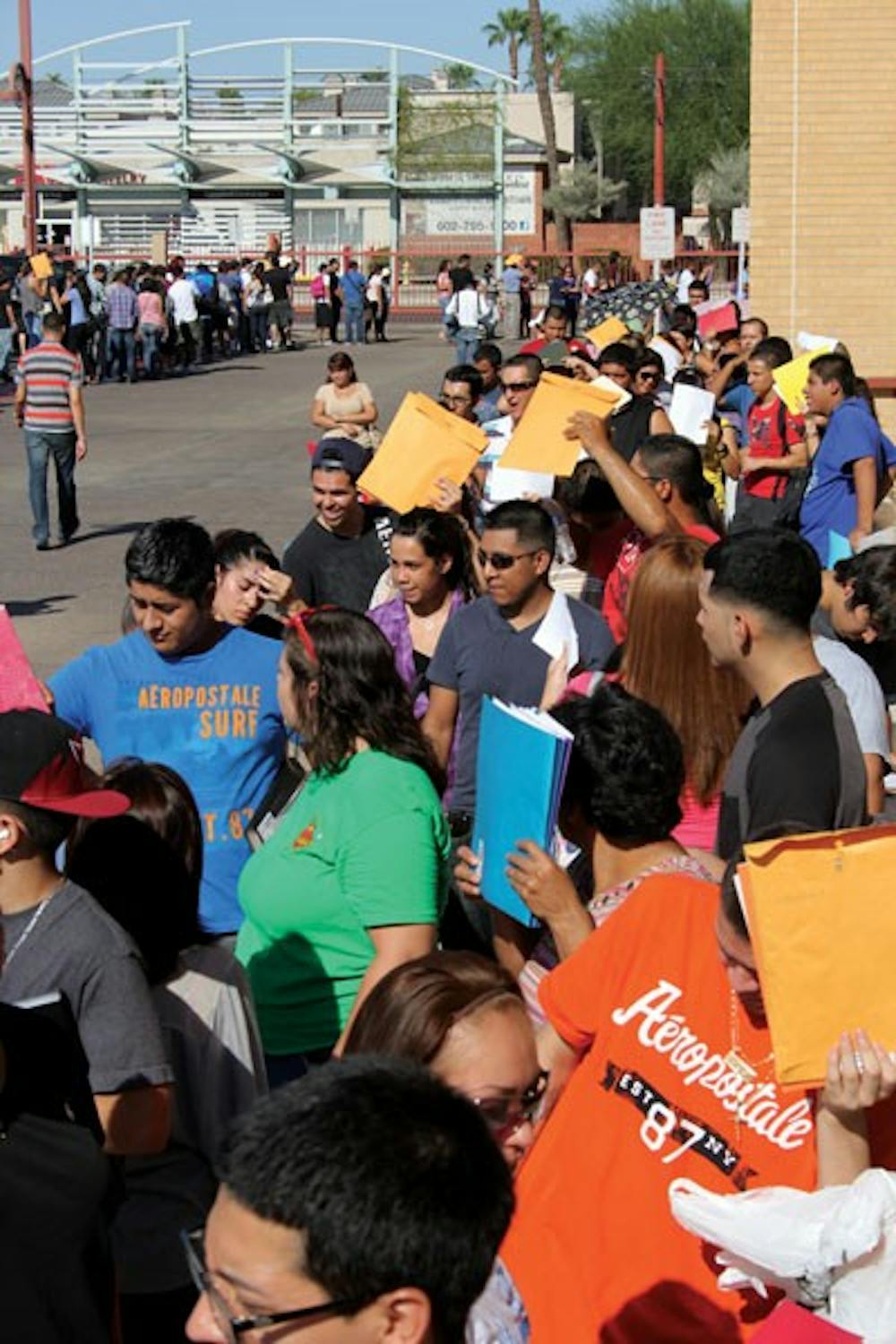 Three thousand DREAMers and supporters lined up for a Deferred Action Application Clinic-Workshop at Central High School Saturday morning. DREAMers are a group of undocumented immigrants who were recently denied public benefits such as scholarships. (Photo by Ana Ramirez)
Three thousand DREAMers and supporters lined up for a Deferred Action Application Clinic-Workshop at Central High School Saturday morning. DREAMers are a group of undocumented immigrants who were recently denied public benefits such as scholarships. (Photo by Ana Ramirez)Long lines of anxious DREAM Act supporters wrapped around Central High School, seeking shade as they waited for their chance to participate in a Deferred Action Application Clinic-Workshop.
Three thousand DREAMers and their supporters filled the school Saturday, ready to postpone the threat of deportation.
Earlier this summer, President Barack Obama announced a program allowing a two-year deportation delay for young illegal immigrants who want to attend school, serve in the military or work in the U.S.
Since the announcement, qualifying immigrants have been waiting for the day they could file their U.S. Citizenship and Immigration Services forms. People were able to begin the process on July 15.
Sponsored by the No Dream Deferred Campaign, a coalition of immigration activists, the informational sessions are meant to educate young people about the process.
No Dream Deferred Campaign member Carmen Cornejo said the president’s announcement was the first step toward immigration reform.
“This is not the end, just the beginning,” Cornejo said.
Many of the young people she’s met have questions about the proper documentation needed to apply, she said.
The USCIS forms require applicants to be 31 or younger and provide proof that they were 16 or younger when they moved to the country.
Applicants must show history of all schooling, jobs and addresses, according to the forms.
Evelyn Alvidrez, 26, said she hoped to get questions answered during the No Dream Deferred Campaign.
“I haven’t filled out my application because you can only fill it out once and I want to make sure I get the proper documentation,” she said.
Johnny Sinodis is a lawyer for the American Immigration Lawyer Association, one of the groups participating in the No Dream Deferred Campaign.
He said it was important for applicants to have all the correct documentation before filing USCIS forms because there is no appeal process.
“Obviously they can submit the application again if it’s denied, but the chances of having an approval after a denial is much slimmer,” he said.
Sinodis said one of the biggest obstacles the NDD faces is making sure people were provided with solid information.
“On the day of the announcement, ‘notarios’ (immigration consultants who give fraudulent contracts) and unscrupulous attorneys were handing out single sheets of paper and saying that the individual was eligible for deferred action,” he said. “DREAMers were paying $500 or more for this piece of paper that meant nothing.”
Sinodis said he wants immigrant communities to understand that the No Dream Deferred Campaign is supported by community organizations and has the resources, like qualified attorneys, to provide guidance on filling out the application.
During the Deferred Action Application Clinic-Workshop, the coalition reported between 310 to 340 DREAMers who had their applications and supporting documents reviewed by attorneys.
More than 100 people discussed eligibility issues like criminal records. A quarter of those applicants were cleared to complete the application.
Supporters of deferred action have been angered by Gov. Jan Brewer’s recent executive order denying applicants driver licenses and other public benefits.
Sinodis said he wasn’t surprised by Brewer’s comments.
“Jan Brewer doesn’t know anything about immigration laws,” he said. “People who received deferred action are authorized to be in the United States, they don’t have lawful status but the government has authorized them to stay here.”
Sinodis said Brewer likely meant to say people without lawful status can’t get a driver’s license or other state benefits, but what she actually said was they were unlawfully present.
The Arizona Board of Regents will evaluate its actions regarding the deferred action plan and Brewer’s orders, ABOR spokeswoman Katie Paquet said in an email.
“We will be reviewing the Governor’s executive order and its implications,” she said.
Damien Lorenzo, 25, a DREAMer, said Brewer is just doing what it takes to get reelected.
“I think people just act without knowing people’s situations,” he said. “We’re so easy to judge people, but everyone has a story.”
Lorenzo came to the U.S. when he was 9 years old and said he would feel like a scared little kid if he was forced to go back to Mexico.
“This is the country that fed me,” he said. “I feel American.”
Reach the reporter at amrami13@asu.edu




